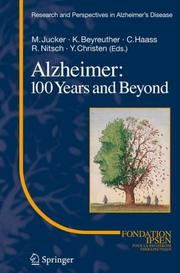| Listing 1 - 3 of 3 |
Sort by
|

ISBN: 1280701951 9786610701957 3540376526 3540376518 3642072321 Year: 2006 Publisher: Berlin ; New York : Springer,
Abstract | Keywords | Export | Availability | Bookmark
 Loading...
Loading...Choose an application
- Reference Manager
- EndNote
- RefWorks (Direct export to RefWorks)
Few medical or scientific addresses have so unmistakeably made history as the presentation delivered by Alois Alzheimer on November 4th, 1906 in Tübingen. The celebratory event, "Alzheimer 100 Years and Beyond" organized on the initiative of the Alzheimer community in Germany and worldwide, in collaboration with the Fondation Ipsen, at the very site of the original lecture, namely the Institute of Psychiatry at the University of Tübingen in Germany from November 2nd to 5th, 2006, was the highlight of the Alzheimer Year. Over the last century of Alzheimer research (1906-2006), remarkable progress has been achieved. Most of the authors of the major discoveries and the people involved in research in this field will present, during the meeting and in this volume, the pioneering research explaining the conditions under which they were conducted. The goal of this book is to honor the work accomplished, to summarize the most important knowledge and to provide material for the history of science.
Alzheimer's disease --- History --- Alzheimer disease --- Alzheimer's dementia --- Basal ganglia --- Presenile dementia --- Senile dementia --- Diseases --- Neurosciences. --- Neural sciences --- Neurological sciences --- Neuroscience --- Medical sciences --- Nervous system
Book
ISBN: 3642446965 3642354904 3642354912 Year: 2013 Publisher: New York : Springer,
Abstract | Keywords | Export | Availability | Bookmark
 Loading...
Loading...Choose an application
- Reference Manager
- EndNote
- RefWorks (Direct export to RefWorks)
The misfolding and aggregation of specific proteins is an early and obligatory event in many of the age-related neurodegenerative diseases of humans, and appears to occur many years before the onset of clinical symptoms. The initial cause of this pathogenic cascade and the means whereby disease spreads through the nervous system, remain uncertain. A recent surge of research, first instigated by pathologic similarities between prion disease and Alzheimer’s disease, has increasingly implicated corruptive protein templating, or seeding, as a prime factor in the neurodegenerative process. The prion-like corruption of proteins also characterizes such clinically and etiologically diverse neurological disorders as Parkinson’s disease, Huntington’s disease, amyotrophic lateral sclerosis, and frontotemporal lobar degeneration. Understanding the misfolding, aggregation, trafficking and pathogenicity of affected proteins thus could reveal universal principles and common therapeutic targets for some of the most devastating and intractable human brain disorders.
Nervous system -- Degeneration. --- Neurodegenerative diseases. --- Prion diseases. --- Prions. --- Sleep disorders. --- Medicine --- Health & Biological Sciences --- Neurology --- Nervous system --- Degeneration. --- Degeneration, Nerve --- Nerve degeneration --- Nervous system degeneration --- Neurodegenerative disease --- Neurodegenerative diseases --- Neurodegenerative disorders --- Neuron degeneration --- Nissl degeneration --- Retrograde degeneration --- Wallerian degeneration --- Infectious protein particles --- Prion proteins --- Protein particles, Infectious --- Proteinaceous infection particles --- PrP proteins --- Degeneration and regeneration --- Medicine. --- Neurosciences. --- Pharmacology. --- Biomedicine. --- Pharmacology/Toxicology. --- Degeneration (Pathology) --- Proteins --- Toxicology. --- Chemicals --- Pharmacology --- Poisoning --- Poisons --- Neural sciences --- Neurological sciences --- Neuroscience --- Medical sciences --- Toxicology --- Drug effects --- Medical pharmacology --- Chemotherapy --- Drugs --- Pharmacy --- Physiological effect


ISBN: 9783540376514 9783540376521 3540376518 Year: 2006 Publisher: Berlin ; New York : ©2006 Springer,
Abstract | Keywords | Export | Availability | Bookmark
 Loading...
Loading...Choose an application
- Reference Manager
- EndNote
- RefWorks (Direct export to RefWorks)
Few medical or scientific addresses have so unmistakeably made history as the presentation delivered by Alois Alzheimer on November 4th, 1906 in Tübingen. The celebratory event, "Alzheimer 100 Years and Beyond" organized on the initiative of the Alzheimer community in Germany and worldwide, in collaboration with the Fondation Ipsen, at the very site of the original lecture, namely the Institute of Psychiatry at the University of Tübingen in Germany from November 2nd to 5th, 2006, was the highlight of the Alzheimer Year. Over the last century of Alzheimer research (1906-2006), remarkable progress has been achieved. Most of the authors of the major discoveries and the people involved in research in this field will present, during the meeting and in this volume, the pioneering research explaining the conditions under which they were conducted. The goal of this book is to honor the work accomplished, to summarize the most important knowledge and to provide material for the history of science.
Alzheimer Disease --- Alzheimer's disease --- Maladie d'Alzheimer --- Congresses. --- history --- Congresses --- History --- Congrès --- Histoire --- Alzheimer, Alois --- EPUB-LIV-FT SPRINGER-B LIVBIOMO LIVMEDEC --- Alzheimer, Maladie d' --- Alzheimer, Alois. --- Alzheimer Disease. --- history.
| Listing 1 - 3 of 3 |
Sort by
|

 Search
Search Feedback
Feedback About UniCat
About UniCat  Help
Help News
News